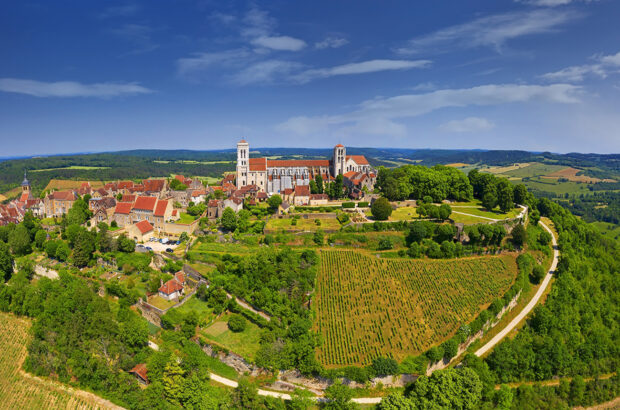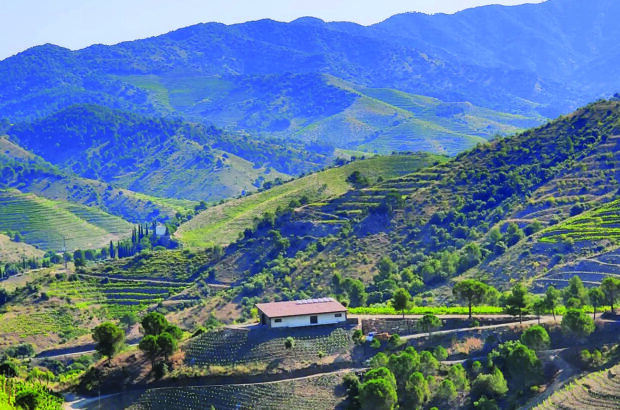The name Schiava denotes an ancient group of heterogeneous Alpine grape varieties, united originally by an innovative training system which used dedicated posts or poles for support rather than the branches of overhanging trees. Vines tied to these posts were thus ‘enslaved’: Schiava is Italian for slave.
Scroll down to see tasting notes and scores for 18 Schiava wines to try
Nowadays three main biotypes of Schiava (Vernatsch in German) are grown in the Alto Adige region of Italy, known by numerous Italian and German synonyms. While Schiava Grossa (‘large’ – the most commonly planted biotype, also known as Trollinger in Germany’s Württemburg, where it’s widely grown) and Schiava Gentile (‘fine’) share similarities and may in fact be related, the rarer Schiava Grigia has more distinctive characteristics.
{"content":"PHA+U3VjaCBkZXRhaWwgY2FuIHNlZW0gYWNhZGVtaWMgd2hlbiBET0MgcmVndWxhdGlvbnMgcmVmZXIgb25seSB0byDigJhsZSBzY2hpYXZl4oCZIChwbHVyYWwpIGFuZCBub3QgaW5kaXZpZHVhbCBjdWx0aXZhcnMuIFRoZSBuYW1lIGhhcyB0aHVzIGJlY29tZSBhIGJsYW5rZXQgdGVybSB0byBjb3ZlciB0aGUgdmFyaW91cyBvcHRpb25zLCBhbmQgcGFydGljdWxhciB2YXJpZXRpZXMgYXJlIG9ubHkgcmFyZWx5IG1lbnRpb25lZCBvbiBsYWJlbHMuPC9wPgo8cD5TY2hpYXZhIGludmFyaWFibHkgcHJvZHVjZXMgcGFsZS1jb2xvdXJlZCwgbGlnaHQgdG8gbWVkaXVtLWJvZGllZCwgYWNjZXNzaWJsZSByZWRzIHdpdGggbG93IGxldmVscyBvZiB0YW5uaW4gYW5kIGJhbGFuY2VkIGFjaWRpdHkgZm9yIGltbWVkaWF0ZSB0aHJvdWdoIHRvIG1lZGl1bS10ZXJtIGRyaW5raW5nLiBUaG91Z2ggZ3Jvd24gdGhyb3VnaG91dCB0aGUgQWx0byBBZGlnZSByZWdpb24sIFNjaGlhdmHigJlzIHRyYWRpdGlvbmFsIHN0cm9uZ2hvbGRzIG9mIFNhbnRhIE1hZGRhbGVuYSAoU3QgTWFnZGFsZW5lcikganVzdCBhYm92ZSBCb2x6YW5vICh3aGVyZSB1cCB0byAxNSUgb2YgbG9jYWwgcmVkIGdyYXBlIExhZ3JlaW4gbWF5IGJlIGFkZGVkKSwgdGhlIExhZ28gZGkgQ2FsZGFybyAoS2FsdGVyZXJzZWUpIERPQyBmdXJ0aGVyIHNvdXRoLCBhbmQgdGhlIGhpbGxzIHN1cnJvdW5kaW5nIE1lcmFubyBvdmVyIHRvIHRoZSB3ZXN0LCBwcm9kdWNlIG1hbnkgb2YgdGhlIGZpbmVzdCBib3R0bGVzLjwvcD4KPHA+U2NoaWF2YeKAmXMgcG9wdWxhcml0eSBwZWFrZWQgaW4gdGhlIDE5NzBzIHdoZW4gdGFua2VycyBvZiBpdHMgcGFsZSBhbmQsIGZyYW5rbHkgYW5vbnltb3VzLCBidWxrIHJlZCB3aW5lcyB3ZXJlIHNvbGQgYXQgYmFyZ2FpbiBiYXNlbWVudCBwcmljZXMgdG8gdGhlIHJlZ2lvbuKAmXMgdHJhZGl0aW9uYWwgbWFya2V0cyBvZiBzb3V0aGVybiBHZXJtYW55IGFuZCBBdXN0cmlhLiBBdCB0aGUgaGVpZ2h0IG9mIHRoaXMg4oCYc3VjY2Vzc+KAmSwgU2NoaWF2YSBjb3ZlcmVkIGFyb3VuZCA2OCUgb2YgdGhlIHJlZ2lvbuKAmXMgZW50aXJlIHZpbmV5YXJkIGFyZWEuPC9wPgo8cD48ZGl2IGNsYXNzPSJhZC1jb250YWluZXIgYWQtY29udGFpbmVyLS1tb2JpbGUiPjxkaXYgaWQ9InBvc3QtaW5saW5lLTIiIGNsYXNzPSJpcGMtYWR2ZXJ0Ij48L2Rpdj48L2Rpdj48L3A+CjxoMj5EZWNsaW5pbmcgbnVtYmVyczwvaDI+CjxwPlRoZSBBbHRvIEFkaWdl4oCZcyBtdWNoLWhlcmFsZGVkIOKAmFF1YWxpdHkgUmV2b2x1dGlvbuKAmSBvZiB0aGUgMTk4MHMsIGluIHRhbmRlbSB3aXRoIGEgc2hpZnQgaW4gd2luZS1kcmlua2luZyBoYWJpdHMgdG93YXJkcyByaWNoZXIsIGZ1bGxlci1ib2RpZWQgcmVkcyBzYXcgcGxhbnRpbmdzIG9mIFNjaGlhdmEgZHJvcCBtYXNzaXZlbHkgZnJvbSBvdmVyIDMsNTAwIGF0IGl0cyBwZWFrLCB0byBqdXN0IDQ3OSBoZWN0YXJlcyB0b2RheSAoYXJvdW5kIDklIG9mIHRvdGFsIHBsYW50aW5ncykuIFRoaXMgdHJhbnNsYXRlcyB0byBhcm91bmQgMy4yIG1pbGxpb24gYm90dGxlcyBwcm9kdWNlZCBhbm51YWxseTsgbnVtYmVycywgc2FkbHksIGNvbnRpbnVlIHRvIGRlY2xpbmUuPC9wPgo8cD5VbmZhc2hpb25hYmxlIHRoZXkgbWF5IGJlLCBidXQgU2NoaWF2YSB3aW5lcyBoYXZlIG5ldmVyIGJlZW4gYmV0dGVyOiBuZXcgY2xvbmVzLCBhIGJldHRlciBpbmZvcm1lZCBjaG9pY2Ugb2Ygc2l0ZSwgYW5kIGNhcmVmdWxseSBjb250cm9sbGVkIHlpZWxkcyBhcmUgbWFqb3IgZmFjdG9ycy4gTW9yZW92ZXIsIG1hbnkgb2YgdGhlIHJlbWFpbmluZyB2aW5lcyBhcmUgbm93IHVwd2FyZHMgb2YgNDAgeWVhcnMgb2xkICh3aXRoIGEgaGVhbHRoeSBudW1iZXIgb2YgY2VudGVuYXJpYW4gdmluZXMsIHRvbykgYW5kIHByb2R1Y2UgdmVyeSBoaWdoIHF1YWxpdHkgZnJ1aXQuPC9wPgo8aDI+VmVyc2F0aWxpdHk8L2gyPgo8cD5Ub2RheeKAmXMgU2NoaWF2YSBpcyBhIHBlcmZlY3QgaWxsdXN0cmF0aW9uIG9mIHRoZSBlbGVnYW50IGFuZCBzdXBwbGUsIGxpZ2h0ZXItYm9kaWVkIHJlZCBzdHlsZSB0aGF0IHRoZSBBZGlnZSB2YWxsZXkgZG9lcyBzbyB3ZWxsICh0aGluayBvZiBCYXJkb2xpbm8gYW5kIDxhIGhyZWY9Imh0dHBzOi8vd3d3LmRlY2FudGVyLmNvbS9wcmVtaXVtL2V4cGVydHMtY2hvaWNlLXZhbHBvbGljZWxsYS0yMDIzLTUwODAyNS8iIHRhcmdldD0iX2JsYW5rIiByZWw9Im5vb3BlbmVyIG5vcmVmZXJyZXIiPjxzdHJvbmc+VmFscG9saWNlbGxhPC9zdHJvbmc+PC9hPiBmdXJ0aGVyIGRvd24gdGhlIHJpdmVyKS48L3A+CjxkaXYgY2xhc3M9ImFkLWNvbnRhaW5lciBhZC1jb250YWluZXItLW1vYmlsZSI+PGRpdiBpZD0icG9zdC1pbmxpbmUtMyIgY2xhc3M9ImlwYy1hZHZlcnQiPjwvZGl2PjwvZGl2Pgo8ZGl2IGNsYXNzPSJpbmplY3Rpb24iPjwvZGl2Pgo8cD5TbyB3aGF0IG1ha2VzIFNjaGlhdmEgc28gc3BlY2lhbD8gVGhlIGFuc3dlciBpcyBpdHMgYW1hemluZyB2ZXJzYXRpbGl0eTogaXQgcGFpcnMgd2VsbCB3aXRoIGFsbW9zdCBhbnkgZm9vZCwgYW5kIHRoYW5rcyB0byBpdHMgc2hlZXIgZHJpbmthYmlsaXR5IGV2ZW4gd29ya3Mgd2VsbCBhcyBhbiBhcGVyaXRpZiBvciBzb2NpYWwgYmV2ZXJhZ2UuPC9wPgo8cD5FeHBlY3QgYXJvbWFzIG9mIHJlZCBmcnVpdHMgKGNyYW5iZXJyeSwgcmVkY3VycmFudCwgcmFzcGJlcnJ5IGFuZCBzdHJhd2JlcnJ5KSBhbmQgcGx1bSB3aXRoIGZsb3JhbCBhbmQgdG9hc3RlZCBhbG1vbmQtbGlrZSBub3RlczsgYSBzbGVlayBhbmQgZ2VudGx5IHNwaWN5IChhbmlzZWVkKSBwYWxhdGUgd2l0aCBqdWljeSBmcmVzaG5lc3M7IGFuZCBhIGxpbmdlcmluZywgc2F2b3VyeS10b25lZCBhbmQgc29tZXRpbWVzIGxpZ2h0bHkgc21va3kgZmluaXNoLjwvcD4KPGRpdiBjbGFzcz0iYWQtY29udGFpbmVyIGFkLWNvbnRhaW5lci0tbW9iaWxlIj48ZGl2IGlkPSJwb3N0LWlubGluZS00IiBjbGFzcz0iaXBjLWFkdmVydCI+PC9kaXY+PC9kaXY+CjxwPkl04oCZcyBkaWZmaWN1bHQgdG8gcmVzaXN0IFNjaGlhdmHigJlzIHlvdXRoZnVsIGNoYXJtcywgYnV0IHRoZSBmaW5lc3QgZXhhbXBsZXMgY2FuIGFnZSBmb3IgdXAgdG8gYSBkZWNhZGUuPC9wPgo8cD4K"}
18 Schiava wines to try:
{}
{"wineId":"78813","displayCase":"standard","paywall":true}
{"wineId":"78808","displayCase":"standard","paywall":true}
{"wineId":"78798","displayCase":"standard","paywall":true}
{"wineId":"78804","displayCase":"standard","paywall":true}
{"wineId":"78800","displayCase":"standard","paywall":true}
{"wineId":"78815","displayCase":"standard","paywall":true}
{"wineId":"78810","displayCase":"standard","paywall":true}
{"wineId":"78806","displayCase":"standard","paywall":true}
{"wineId":"78802","displayCase":"standard","paywall":true}
{"wineId":"78799","displayCase":"standard","paywall":true}
{"wineId":"78807","displayCase":"standard","paywall":true}
{"wineId":"78812","displayCase":"standard","paywall":true}
{"wineId":"78811","displayCase":"standard","paywall":true}
{"wineId":"78814","displayCase":"standard","paywall":true}
{"wineId":"78805","displayCase":"standard","paywall":true}
{"wineId":"78809","displayCase":"standard","paywall":true}
{"wineId":"78803","displayCase":"standard","paywall":true}
{}
Related articles












